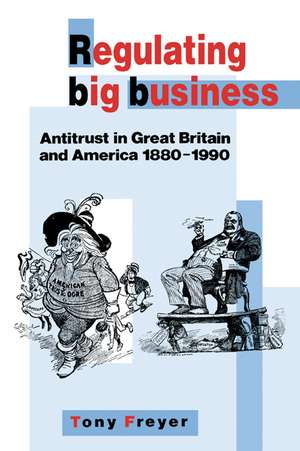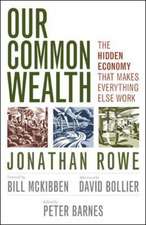Regulating Big Business: Antitrust in Great Britain and America, 1880–1990
Autor Tony Freyeren Limba Engleză Paperback – 3 feb 2008
| Toate formatele și edițiile | Preț | Express |
|---|---|---|
| Paperback (1) | 407.31 lei 6-8 săpt. | |
| Cambridge University Press – 3 feb 2008 | 407.31 lei 6-8 săpt. | |
| Hardback (1) | 787.97 lei 6-8 săpt. | |
| Cambridge University Press – 4 mar 1992 | 787.97 lei 6-8 săpt. |
Preț: 407.31 lei
Nou
Puncte Express: 611
Preț estimativ în valută:
77.94€ • 81.37$ • 64.50£
77.94€ • 81.37$ • 64.50£
Carte tipărită la comandă
Livrare economică 04-18 aprilie
Preluare comenzi: 021 569.72.76
Specificații
ISBN-13: 9780521059749
ISBN-10: 0521059747
Pagini: 416
Dimensiuni: 152 x 228 x 27 mm
Greutate: 0.61 kg
Editura: Cambridge University Press
Colecția Cambridge University Press
Locul publicării:Cambridge, United Kingdom
ISBN-10: 0521059747
Pagini: 416
Dimensiuni: 152 x 228 x 27 mm
Greutate: 0.61 kg
Editura: Cambridge University Press
Colecția Cambridge University Press
Locul publicării:Cambridge, United Kingdom
Cuprins
Introduction; 1. The response to big business: the formative era, 1880–1914; 2. The divergence of economic thought; 3. The political response; 4. The courts respond to big business; 5. The impact of World War I, 1914–1921; 6. Tentative convergence, 1921–1948; 7. A British antimonopoly policy emerges, 1940–1948; 8. Uneven convergence since World War II; Conclusion.
Recenzii
"This is a well-documented book, and Freyer has done impressive primary research....Freyer's contribution here is to focus on antitrust itself...to evaluate all the major cases, doctrines, legislative acts, and administrative approaches of the two countries, and then to compare them systematically with each other. This is a daunting task, here done acceptably well...." Thomas K. McGraw, Journal of American History
"Freyer's comparative perspective required mastery of a vast literature produced by several disciplines--law, economics, and history--in both countries. In these chapters on the first era of modern capitalism, and throughout the book, Freyer demonstrates this mastery; he has produced a solidly researched and imaginative treatment and persuasively argued his thesis." Robert F. Himmelberg, Review in American History
"...explains the important developments in the law after the Progressive Era that shaped the strategy and structure of big business firms. What emerges, in short, is an analysis of how law shaped the business firm in the twentieth century....Freyer's work is all the better because it is comparative. Not only does his argument reflect deep learning in both business and legal history, but it also reflects wisdom arising from exploring legal traditions and corporate organization in both Britain and the United States....brilliant...." K. Austin Kerr, Business History Review
"Freyer's account is told with great skill, by someone who is not only familiar with the historical literature, but who has also managed the technical details of competition and antitrust law. Further the story is lively and written so as to be easily understood by those whose experience with technical legal language is not so well developed. Finally, the story takes theory as well as politics seriously--something that every responsible accounting of economic policy must do, no matter what its author's final position." Herbert Hovenkamp, Law and History Review
"...the fullest treatment of the emergence of the policy in Britain that has yet appeared." Donald Dewey, History of Political Economy
"Freyer's comparative perspective required mastery of a vast literature produced by several disciplines--law, economics, and history--in both countries. In these chapters on the first era of modern capitalism, and throughout the book, Freyer demonstrates this mastery; he has produced a solidly researched and imaginative treatment and persuasively argued his thesis." Robert F. Himmelberg, Review in American History
"...explains the important developments in the law after the Progressive Era that shaped the strategy and structure of big business firms. What emerges, in short, is an analysis of how law shaped the business firm in the twentieth century....Freyer's work is all the better because it is comparative. Not only does his argument reflect deep learning in both business and legal history, but it also reflects wisdom arising from exploring legal traditions and corporate organization in both Britain and the United States....brilliant...." K. Austin Kerr, Business History Review
"Freyer's account is told with great skill, by someone who is not only familiar with the historical literature, but who has also managed the technical details of competition and antitrust law. Further the story is lively and written so as to be easily understood by those whose experience with technical legal language is not so well developed. Finally, the story takes theory as well as politics seriously--something that every responsible accounting of economic policy must do, no matter what its author's final position." Herbert Hovenkamp, Law and History Review
"...the fullest treatment of the emergence of the policy in Britain that has yet appeared." Donald Dewey, History of Political Economy
Descriere
This book explores the development of big business and the antitrust response in a comparative context.







